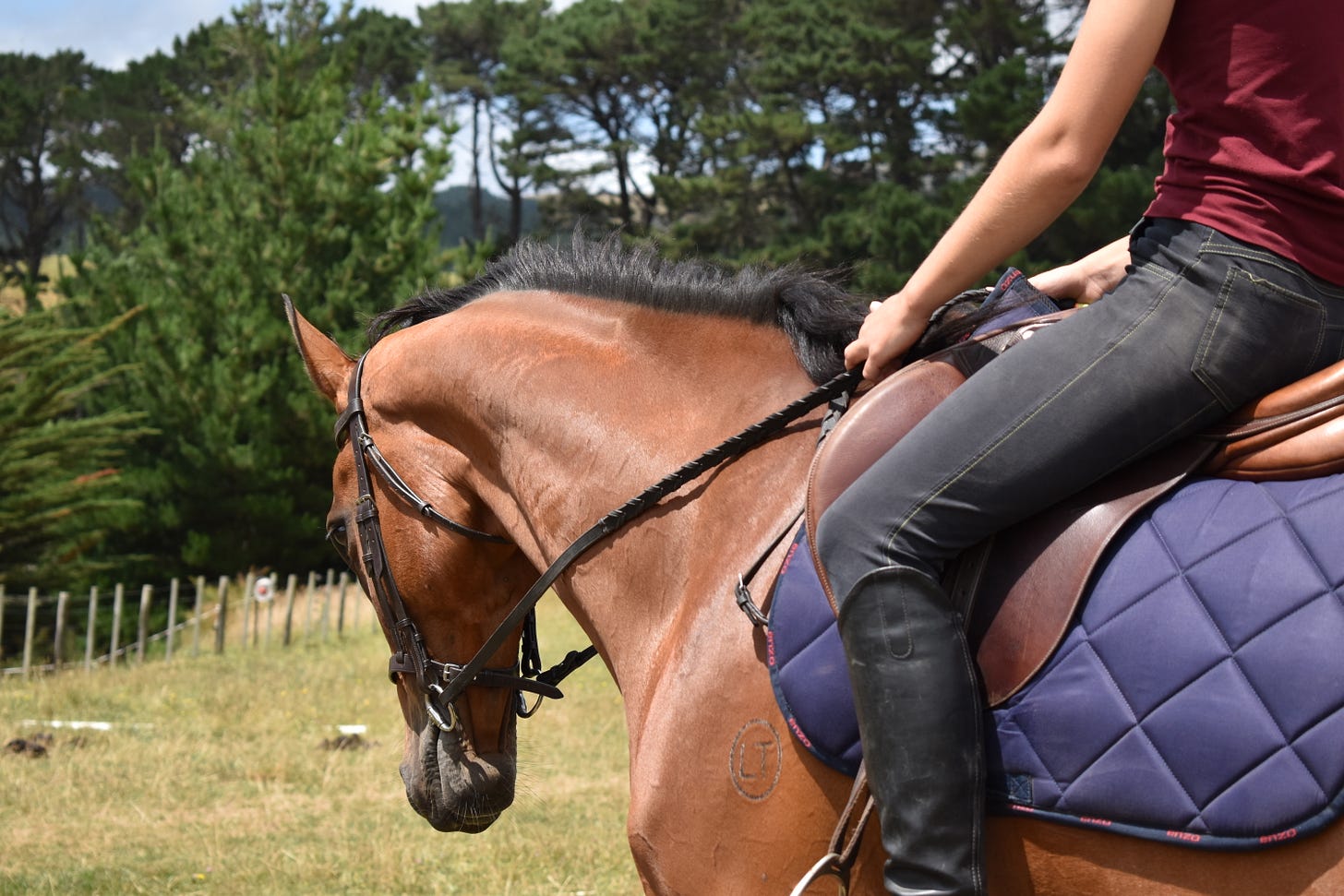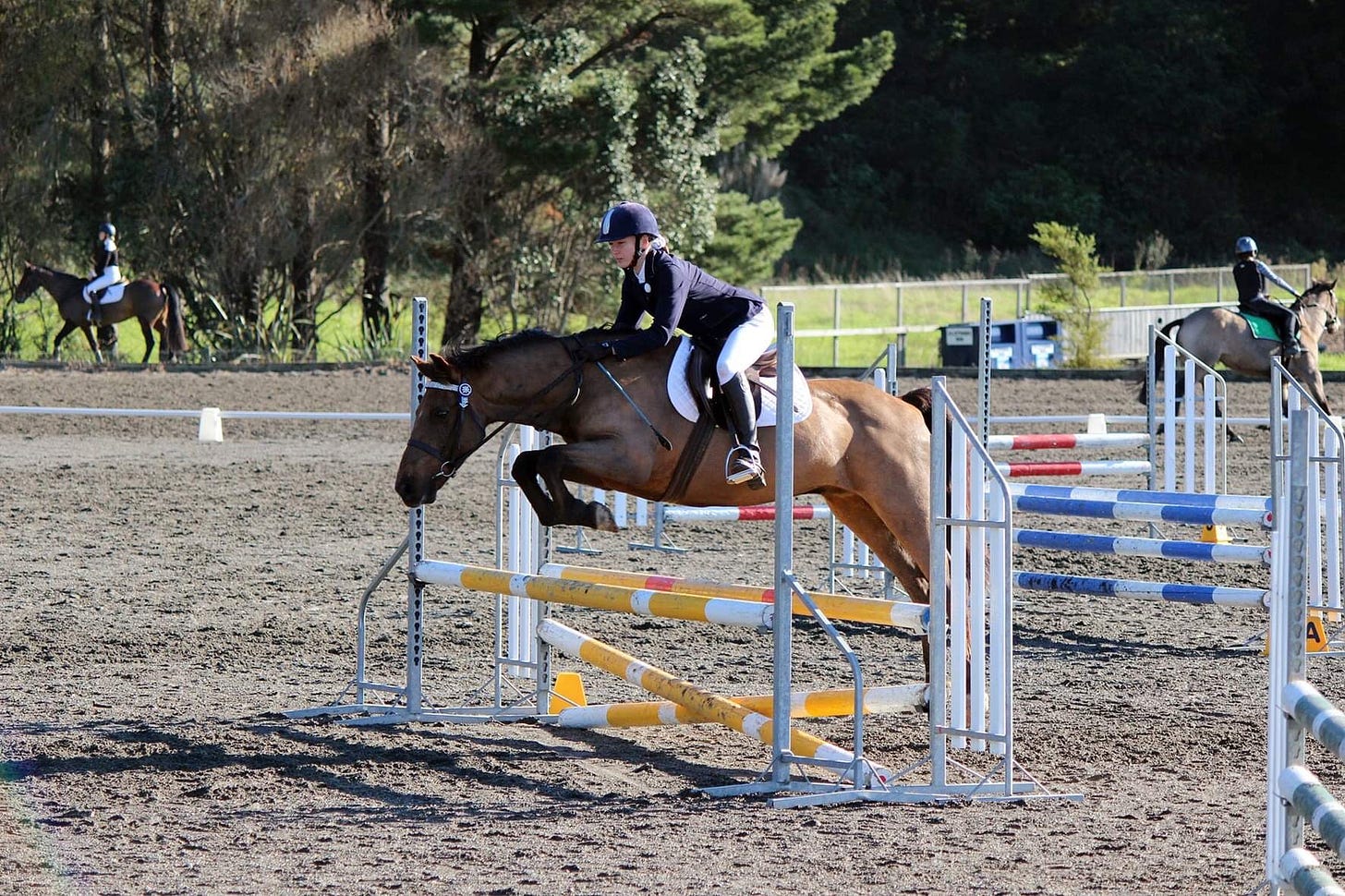Imposter syndrome has been one of my closest enemies (what’s that saying about keeping your enemies close?) for a while now.
Today, when that voice in my head crept in and told me that I’m not deserving of the praise that people have given me recently, I was able to see it for what it is - an intrusive voice in my head that doesn’t belong to me (and maybe I am going crazy with all these voices in my head).
So I had this little conversation with myself (yep, definitely crazy) and tried to figure out where that voice was coming from. If not me, then who?
I think I might have figured out where it all started.
I used to ride horses. I don’t really like saying that in the past tense. I guess I still do ride horses, but much less regularly than I’d like, because, unfortunately, life gets busy, I sold my horses to go to university, and horse riding is expensive.
I used to be a full on horse girl though. You know the type. Lived and breathed horses all day long. Art project at school? I’d make it about horses. Science fair project? About horses. All my birthday and Christmas presents were for my horses. Yes, I may even have eaten some horse food if I was hungry while riding. Sue me.
It probably comes as no surprise then, that my year 10 persuasive speech was - about horses. My topic was persuading people that horse riding was a sport, since half of the class seemed determined to point out that the horse did all the work and we just sat there. A statement that my devoted horse girl self was completely triggered by at first, and soon came to the conclusion that you know what, maybe they were right.
The comments eventually wore me down and to this day I feel as if maybe my favourite sport in the whole world is not even a sport.
I don’t really know if the fact that we do more than just ‘sit there’ means it’s a sport. I mean, we work up a sweat, my Oura ring counts it as a workout, but, you’re right, the horse does a lot of work too. Even as riders, we make sure (at least those of us ‘good horsewomen’) that the horse gets all the credit. It’s drilled into us.
But the point of this substack post is not to convince you that riding is a sport. Or not a sport. Really, I don’t care what you believe (sorry). It’s to talk about imposter syndrome.
Pretty much since I first started horse riding, there were ‘haters’. Both within the riding industry, and outsiders.
I learnt almost from day one that if we do bad, it’s the rider’s fault, but if we do good, it’s the horses fault. If we fall, get up and pat the horse because it wasn’t the horses fault. If we win, pat the horse because he did an amazing job.
Taking on the responsibility of anything that ever went wrong taught me a lot about accountability, about trying your best, and about good sportsmanship (but if riding isn’t a sport can I even call it sportsmanship?).
It also taught me that success is never my own.
Since horses were my entire life, it was inevitable that this attitude flowed over into the other things I did too.
My good grades weren’t because of my hard work, they were because I went to a small school with great teachers. My leadership positions weren’t because I was a good leader, they were because I was friends with people who were good leaders.
It didn’t take long before I found it difficult, cringy or even arrogant to take credit for anything in my life. It was all down to luck, or being in the right place at the right time, or knowing the right contacts.
I never felt like I was truly deserving of my accomplishments, as if I had somehow tricked everyone else into believing I was good enough.
I think that maybe, after years of learning about myself, I’m reaching a point where I am truly proud of my accomplishments. I can take credit for them, even if I do attribute them to the support of others too. But I just released my first book and I noticed those feelings creep back.
“I couldn’t have done it without you” - a nice sentiment in theory. But actually, literally? I could’ve. I still could’ve done it. I think that’s probably what I need to start remembering.
I don’t want to be doubting everything I ever do that I feel a hint of pride for. I don’t want to be questioning whether I have anything to add to this world that hasn’t already been done because, let’s face it, at this point, everything has already been done. That doesn’t stop people enjoying new takes on things though.
So, to anyone who’s listening to those voices in your head telling you you’re not all that, I’m here to tell you, you are. No matter how much support you’ve had, or how many opportunities have been given to you, you are still worthy and capable and deserving.
And horse riding is a sport.
Love from Soph xx







Hey Soph, this is a great blog and such a relevant topic. Imposter Syndrome is a very real thing and still affects so many of us even into our older years when you’d think through life’s experiences we would have left those insecure feelings for dust! I’m glad you’re learning to be proud of and "own “ your successes. Remember there will always be people who will make you doubt yourself - just keep being true to you and know that there are so many people who have your back and will celebrate your successes with you - you’ve got this! x
Horse riding might be a sport to you Soph, but unfortunately it is also animal abuse. Horses, for centuries, have been tamed and forced to become the companion of humans. They didn’t choose us. We chose them. We dominated them. Horses are not interested in being ridden. Like all of us, they want to live their life free.
And calling it a sport is the main cause people participate in horse races. And I don’t think I even have to explain what happens to horses in those races and after.
Can we just love animals just because? Do we have to see them as benefits?
Just yesterday I volunteered for a farm animal sanctuary and the current owner used to work with horses. He said horses can see 340 degrees, and they lose 10 degrees sight in the front and 10 degrees in the back. When you force them to wear those bits on the side claimed to help them focus, it actually blinds them. So people are riding horses who can’t see where they are going.
These are just a few of the many ethical concerns of horse riding.